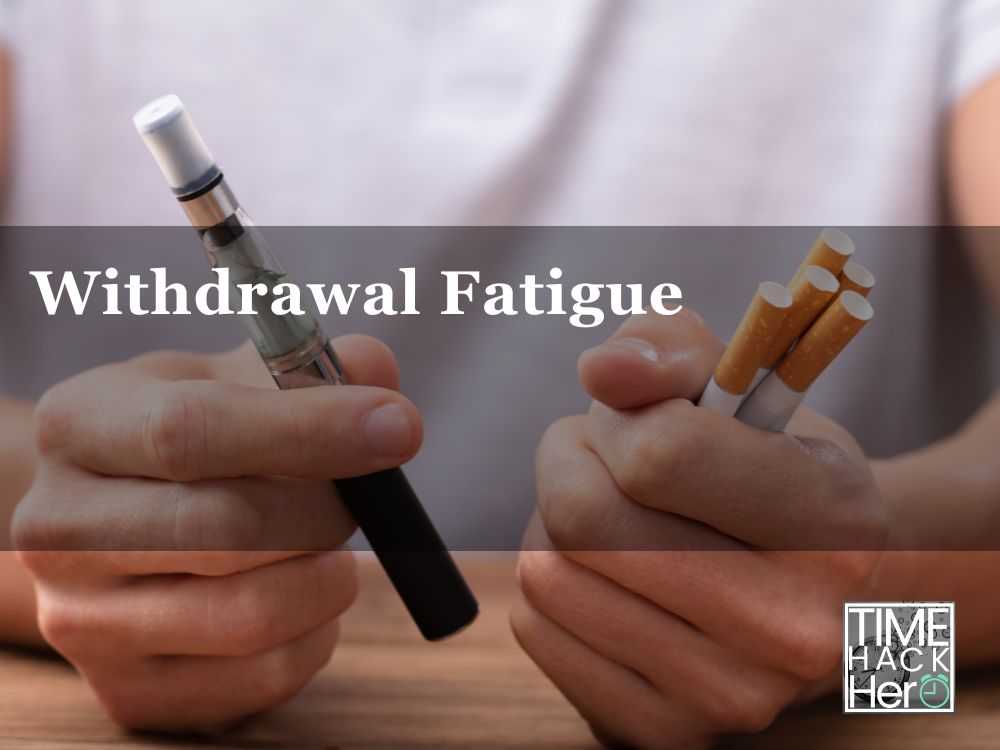Nicotine, the addictive stimulant in tobacco products, is commonly associated with a short-lived boost in alertness and cognitive focus. However, many regular smokers and vape users experience fatigue, sluggishness, and sleepiness from nicotine instead. What causes this paradoxical tired reaction?
Table of Contents
Is This Normal?
Yes, it’s entirely normal to feel tired after nicotine intake despite its stimulant classification. Nicotine provokes several opposing effects in the body that can ultimately leave some people feeling drained instead of energized. However, severe fatigue may signal excessive nicotine dependence.
Why Does Nicotine Make Me Tired?
Why does nicotine make you drowsy instead of energized? There are some key mechanisms behind this phenomenon.
| Cause | Mechanism | Effect |
|---|---|---|
| Biphasic actions | Initial stimulation then desensitization of nicotinic receptors | Sedation following initial alertness |
| Disrupted circadian rhythms | Suppressed melatonin and cortisol spikes | Daytime drowsiness |
| Impaired sleep | Light, disrupted sleep and insomnia | Non-restorative sleep and exhaustion |
| Withdrawal | Dopamine/serotonin depletion, poor concentration, increased appetite, aches | Physical and mental fatigue |
| Reduced motivation | Attenuated dopamine pathways | Avolition, lethargy |
| Oxidative stress | Increased free radicals and reduced antioxidants | Cellular damage requiring energy to control |
Nicotine’s Biphasic Actions
Nicotine exerts complex biphasic effects, providing initial acute stimulation followed by subsequent sedation:
1. Release of Catecholamines
When first ingested, nicotine stimulates the release of catecholamines like dopamine, adrenaline and noradrenaline. This leads to heightened arousal, focus and alertness.
2. Overstimulation of Nicotinic Receptors
But over time, accumulated nicotine overstimulates and desensitizes nicotinic acetylcholine receptors in the brain. This inhibits neuronal excitability, causing sedation.
So the short-term stimulating effects fade due to receptor overstimulation, replaced by longer-term fatigue.
Disrupted Circadian Rhythms
Nicotine alters key neurotransmitters that control your circadian sleep-wake cycle:
3. Reduced Melatonin
Nicotine blocks the release of melatonin, the hormone that promotes sleep by conveying darkness signals to the brain. This melatonin suppression leads to daytime drowsiness.
4. Disrupted Cortisol
Nicotine releases cortisol, which should follow a daily circadian rhythm. But frequent cortisol spikes disrupt your body’s natural cortisol fluctuations. This dysregulation contributes to tiredness.
5. Impaired Sleep
Even though nicotine has sedative effects later on, it also significantly disrupts sleep quality:
6. Light Sleep
Nicotine consumption leads to lighter, more disrupted sleep rather than deep, restorative sleep. This impaired sleep quality reduces feeling rested.
7. Withdrawal Overnight
Since nicotine has a short half-life, withdrawal symptoms can emerge while you sleep. These disturbances further impair sleep.
8. Insomnia
Nicotine acts as a stimulant which can make it harder to fall asleep. Withdrawal also often leads to middle of the night waking. These insomnia effects leave you exhausted the next day.
9. Reduced Deep Sleep From Nicotine
| Effect | Consequence |
|---|---|
| Fragmented, light sleep | Lack of restorative deep sleep |
| Overnight withdrawal | Disrupted sleep through the night |
| Later sleep onset | Difficulty falling asleep |
| Nocturnal awakenings | Waking up in the middle of the night |
Withdrawal Fatigue
In dependent smokers, nicotine withdrawal itself also triggers significant fatigue:
10. Depression
Sudden depletion of dopamine and serotonin during nicotine withdrawal creates depression and moodiness. This mental state leaves you tired.
11. Poor Concentration
Nicotine withdrawal reduces acetylcholine, impairing focus and concentration. This mental fogginess is exhausting.
12. Increased Appetite
Nicotine suppresses appetite, so nicotine cessation leads to increased hunger and weight gain. Greater caloric intake makes you lethargic.
13. Aches and Pains
Nicotine withdrawal causes aching muscles and joint pain as inflammation increases without nicotine’s anti-inflammatory effects. These uncomfortable symptoms drain energy.
14. Reduced Motivation and Energy
Through dopamine pathways, nicotine acutely boosts drive and motivation. But prolonged nicotine exposure attenuates these pathways, leading to:
- Avolition – lack of motivation
- Fatigue – low energy
- Lethargy – lack of interest in activity
Thiscreates a self-perpetuating cycle of inactivity and tiredness.
15 Oxidative Stress
Nicotine increases production of reactive oxygen species and suppresses antioxidant defenses:
- Lipid peroxidation – cell membrane damage
- Protein oxidation – enzyme dysfunction
- DNA damage – cellular harm
Detoxifying these effects expends energy and can leave you feeling drained.
Other Factors
Some additional considerations on nicotine and tiredness include:
- Added ingredients like ammonia that enhance nicotine delivery across membranes
- Working against nicotine’s appetite suppression leads to overeating
- Frequent smoke breaks disrupt work productivity and concentration
- Social isolation and stigmatization create psychological drain
- Secondhand smoke exposure degrades health and energy levels
Tips to Avoid Nicotine-Induced Fatigue
If nicotine is making you feel persistently rundown, what can help overcome the fatigue? Consider these tips:
Quit Smoking and Vaping
The most direct solution is to wean yourself off nicotine products through a structured quitting plan. This avoids the cycle of stimulation and fatigue. Withdrawal may temporarily worsen fatigue.
Avoid Nicotine Before Bed
Since nicotine disrupts sleep, avoid smoking or vaping at least 1-2 hours before bedtime. This gives your body a chance to recuperate from stimulating effects.
Address Nutrition and Hydration
Eat plenty of nutrient-rich foods and stay hydrated to fuel your body. Curb sugar and excess carbs that lead to blood sugar spikes and crashes. Stable energy comes from whole foods.
Practice Relaxation Techniques
Tense muscles and chronic stress from nicotine worsen fatigue. Try deep breathing, meditation, yoga, or progressive muscle relaxation to calm the mind and body. Lower stress supports stable energy.
Exercise Regularly
Aim for 30-60 minutes of exercise like brisk walking or cycling most days to increase energy, improve sleep quality, reduce stress, and boost mood. But don’t overdo it if very fatigued.
Optimize Sleep Habits
Focus on consistent bedtimes, limiting electronics before bed, creating a restful sleep environment, and following other healthy sleep habits. Quality sleep is crucial for energy.
Consult Your Doctor
See your healthcare provider to rule out any underlying conditions like sleep apnea, diabetes, or depression that could worsen nicotine-related fatigue. Treatment may help.
Limit Caffeine
Avoid excessive caffeine from coffee, tea, soda and energy drinks as this stresses your endocrine system further. Max 1-2 moderate caffeinated drinks per day.
Seeking Medical Help
Consult your physician if withdrawal symptoms like fatigue, insomnia, or depression persist beyond two weeks after quitting smoking. Certain medications and nicotine substitutes can ease the transition and help you quit for good.
Also see your doctor if you experience chronic fatigue unrelated to withdrawal after you successfully quit smoking, as it could indicate an underlying condition.
Conclusion
While contrary to popular belief, nicotine can induce fatigue by interfering with energy-regulating mechanisms in the body. If nicotine consistently makes you feel tired and rundown despite aiming to quit or cut back, focus on optimizing sleep, nutrition, activity levels, and stress management. Pay attention to any chronic, worsening fatigue as a sign that you may need to speak with a doctor. With some lifestyle adjustments and professional support, managing nicotine-related fatigue is very possible.
Frequently Asked Questions
Can nicotine withdrawal cause fatigue after quitting tobacco use?
Yes, nicotine withdrawal often includes fatigue, brain fog, low energy, insomnia, and headaches in the first 1-2 weeks after quitting. These subside as the body adjusts. Support remedies can help minimize withdrawal fatigue.
Is second-hand smoke exposure linked to fatigue as well?
Yes, even minimal second-hand smoke can introduce enough nicotine to disrupt sleep and energy levels. Second-hand smoke also contains numerous toxins that may contribute to fatigue by impairing lung function.
Does nicotine gum or patches also cause fatigue like smoking?
Yes. While less harmful than smoking, all forms of nicotine intake including vapes, lozenges, patches, and gum have the potential to disrupt sleep, alter neurochemistry, and induce rebound fatigue when they wear off.
Will eating extra snacks help give me energy if nicotine makes me tired?
Maybe. Light healthy snacks can provide an energy boost and stabilize blood sugar. But avoid excessive high-sugar, high-carb snacks which lead to crashes later. Focus more on nutrition, sleep and activity.
Is there a certain time of day when nicotine doesn’t make me as tired?
Usually the mornings, since wakefulness is higher then. Nicotine’s alerting effects also pair well with the body’s circadian rise in energy after waking up. Avoid nicotine in the later afternoons and evenings.












